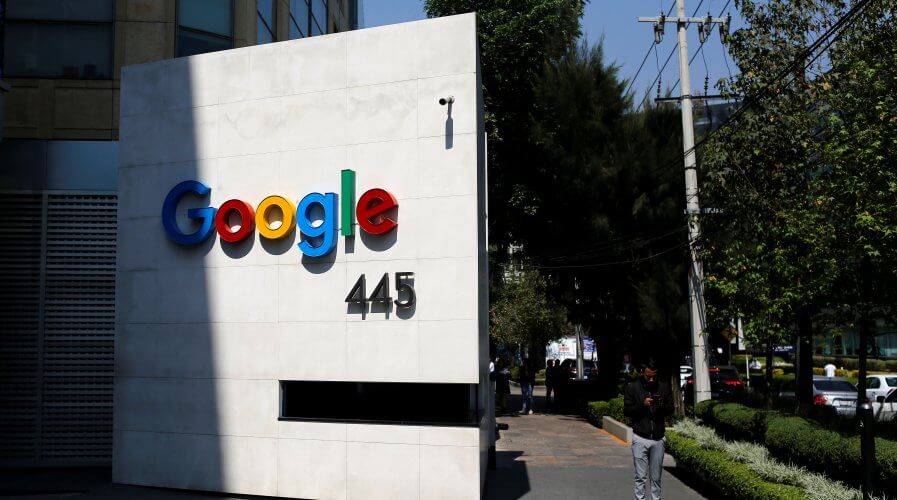
A man checks his phone outside the Google headquarters in Mexico City, Mexico March 13, 2018. Source: Reuters
Why Google and Facebook are under the microscope
INTERNET giants along the lines of Facebook and Google have been getting away with gaining revenue in many countries with little or no tax, but not any longer.
Malaysia is the latest country to mull a proposal to tax Google and Facebook advertisements amid the Southeast Asian country’s battle against “fake news” and declining revenue faced by traditional media outlets.
Malaysia’s Deputy Prime Minister Ahmad Zahid Hamidi recently said the proposal would be presented to cabinet following the idea that was discussed with publication and permit holders on Tuesday, according to The Star.
The development comes after the Malaysian government sought views from the internet giants as part of its effort to draft a new law to combat fake news.
On Monday, Minister in the Prime Minister’s Department Azalina Othman Said met internet giants including Facebook, Twitter, Google and its video-sharing website YouTube, among others, to gain input on the drafted law.
“The meeting was held as a measure to get more views and input from the main players in this new media sector, in line with the Government’s effort to introduce a law on fake news,” she said, as quoted by the Straits Times.
Azalina claimed representatives from the companies provided positive responses during the discussions, adding the meeting was vital to ensuring the law being drafted covered all bases.
“The law drafted will also protect society from becoming victims of fake news. I believe it can curb the global phenomenon of fake news and false information from becoming viral and cancerous to the nation,” she said.
Following after Vietnam
Malaysia’s proposal came after Star Media Group group managing director and chief executive officer Wong Chun Wai, suggested the country follow after a similar revenue-gaining effort mooted by Vietnam to impose tax on ads posted on Facebook and Google.
However, taxing the internet behemoths is not a simple matter as currently, Vietnam’s tax authorities were unable to collect a single penny due to its current tax regulations.
The root of the problem, according to Tuoi Tre News, lies in the country’s ‘foreign contractor tax’. This comprises value-added and corporate income taxes, currently applied on payments a Vietnamese entity makes to a foreign contractor without a licensed presence in Vietnam.
Currently, Facebook and Google pay a five percent value-added tax and a five percent corporate income tax on any revenue generated from their operations in Vietnam.
The payments usually come from Vietnamese companies who make ads on Google and Facebook and the two tech giants refuse to foot the bill.
A similar tax is being considered in Malaysia after the amendment to the Malaysian Income Tax Act 1967 came into effect earlier last year, requiring businesses to pay tax for the internet advertising for the services rendered by offshore companies.
However, the amendment had yet to be properly enforced.
The businesses that rely on the advertisements in both countries are also facing a similar problem: many are confused on how they should pay the taxes.
Advertisers have often asked whether they could pay for Google and Facebook’s services to a local branch of the internet providers to avoid the tax entanglement altogether, but the companies refused allow it.
For example, for invoices to Malaysian companies, Google issues their’s from Singapore while Facebook invoices were addressed in Ireland. Many others, including Amazon, send their bill directly from the United States.
Little tax in Europe
Britain said it was considering taxing the revenues of internet companies like Facebook and Google until international tax rules are changed to cope with digital firms that can shift sales and profits between jurisdictions.
On Tuesday, Finance Minister Philip Hammond said he had published a paper setting out proposals for taxing global digital firms before a meeting with his G20 counterparts later this week.
The paper on Corporate tax and the digital economy highlighted three main points;
• the participation and engagement of users is an important aspect of value creation for certain digital business models.
• the preferred and most sustainable solution to this challenge is reform of the international corporate tax framework to reflect the value of user participation.
• as set out at Autumn Budget, in the absence of such reform, there is a need to consider interim measures such as revenue-based taxes.

Facebook, has helped drive Vietnam’s online business to new heights. Source: Reuters
Big internet companies have previously paid little tax in Europe, typically by channeling sales via countries such as Ireland and Luxembourg, which have light-touch tax regimes.
The European Union has proposed taxing tech giants between 1 and 5 percent of revenue based on where users are located, according to a draft Commision document seen by Reuters last month.
The tax should apply to companies selling user-targeted online ads or providing advertisement space, with revenues above 750 million euros (US$922 million) worldwide and with EU digital revenues of at least 10 million euros, according to the document.
Both Google and Facebook have changed the way they account for their activity in Britain, resulting in a rise in corporate tax paid.
But Facebook UK’s tax charge for 2016, for example, was GBP5.1 million pounds (US$7.09 million), only a modest increase on the GBP4.2 million level in 2015. Its revenue in Britain in 2016 was GBP842 million.
“In the autumn we published a paper on taxing large digital businesses in the global economy and today we follow up with a publication that explores potential solutions,” Hammond said when he delivered an update on the government’s finances.
TechUK, a group representing more than 950 tech firms, said corporate tax was highly complex, and the government needed to consider the risk of unintended consequences that could result from moving to a revenue-based tax approach.
“However, it remains the case that international cooperation and coordination are key,” it said. “Unilateral action in this area continues to risk cutting across international efforts at the OECD (Organisation for Economic Co-operation and Development).”
Additional reporting by Reuters
READ MORE
- Safer Automation: How Sophic and Firmus Succeeded in Malaysia with MDEC’s Support
- Privilege granted, not gained: Intelligent authorization for enhanced infrastructure productivity
- Low-Code produces the Proof-of-Possibilities
- New Wearables Enable Staff to Work Faster and Safer
- Experts weigh in on Oracle’s departure from adland






